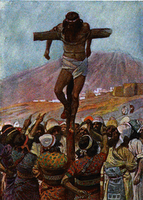Putting the “X” Back in Xmas
 Those of us whose vocations involve writing or speaking about religion often see in the major holy days a two-edged sword. On one hand, most of the pastors I know could roll out of bed at three o’clock in the morning and preach decent, Christ-centered Christmas or Easter sermons.
Those of us whose vocations involve writing or speaking about religion often see in the major holy days a two-edged sword. On one hand, most of the pastors I know could roll out of bed at three o’clock in the morning and preach decent, Christ-centered Christmas or Easter sermons.However, familiarity of the subject means the risk of falling into annual ruts, operating on mental cruise control: “There are so many things to get done; I’m sure this sermon will prepare itself and all I need to do is preach.”
The tonic isn’t novelty for novelty’s sake. We dare not invent new theology in an attempt to keep the message “fresh” or “relevant.” Even if we find a new approach to the age-old story, we must take care lest we descend into cuteness that undercuts the awesome majesty and humble mystery of the Word made Flesh who “dwelt among us ... full of grace and truth (John 1:14).”
During Christmastide, another pitfall oft befalling Christian pastors, teachers, and writers is a straw man mentality. We can latch on to convenient targets outside the group we’re addressing, setting the mentality of “us (good Christians) against them (everyone who doesn’t do Christmas like we do).”
 Each year, well-meaning Christians condemn commercialism, consumerism, and the mixing of the sacred and the secular. Pastors, especially, may rail at “Santa Christian,” who, like the other Santa, only visits us (or our churches) once each year. Other believers circulate petitions or organize boycotts against companies whose employees greet us with “Happy Holidays” instead of “Merry Christmas.”
Each year, well-meaning Christians condemn commercialism, consumerism, and the mixing of the sacred and the secular. Pastors, especially, may rail at “Santa Christian,” who, like the other Santa, only visits us (or our churches) once each year. Other believers circulate petitions or organize boycotts against companies whose employees greet us with “Happy Holidays” instead of “Merry Christmas.”Of course, focusing on the sins and shortcomings of others means that we can overlook our own sins. Sinners rarely mind the preaching of the Law — as long as it isn’t directed at them. And when God’s harsh Law is misapplied to our sinful selves, the His sweet, saving Gospel may likewise have diminished impact.
Bottom line: I can almost guarantee that everywhere in the free world where Christians gather, someone’s going to be demanding that they — whomever “they” might be — “put the ‘Christ’ back in Christmas.” And yes, this is important, but not today’s central theme.
 “Christ” is the first of two words in the compound word “Christmas.” However, “Mass,” the often neglected second fiddle, remains important, whether we acknowledge it or not. Therefore, I’ll join others in arguing that we also need to keep Christ’s Mass (His holy Supper) as an integral part of our Christmas celebration. After all, does the physicality of the Incarnation find any clearer earthly expression than when we actually eat the holy body and drink the precious blood of the Babe of Bethlehem?
“Christ” is the first of two words in the compound word “Christmas.” However, “Mass,” the often neglected second fiddle, remains important, whether we acknowledge it or not. Therefore, I’ll join others in arguing that we also need to keep Christ’s Mass (His holy Supper) as an integral part of our Christmas celebration. After all, does the physicality of the Incarnation find any clearer earthly expression than when we actually eat the holy body and drink the precious blood of the Babe of Bethlehem?But we’re not going to talk about that, either. Instead, we’re taking a look at another believers’ bugaboo, the (mis-) use of the letter X. Among many well intentioned Christians, X has fallen into ill repute. This is too bad, because he sports a noble pedigree and once enjoyed a distinguished career and great honor among his fellow letters. After all, where would algebra be without X? And try to imagine all of those pirate stories devoid of maps reminding the treasure hunter that “X marks the spot.”
Nevertheless, some devout Christians strongly object to using this one letter — X — to replace (or “X out”) six letters — C-H-R-I-S-T — in the word “Christmas.” They don’t want to be numbered among the secularists who try to avoid the whole religious, Christian thingie by using the Xmas shorthand for Jesus’ birthday. However, what most unbelievers don’t realize (and what far too many Christians have forgotten or else never knew) is that X has been “standing in” for Christ for centuries.
 The word Christ begins with the Greek letter Chi. Chi looks like this: X. Because X also reminds many Christians of a cross, the symbolism becomes even stronger. Chi doesn’t always work alone. Sometimes he partners with Rho. This gets a bit tricky, because the Rho has the sound of our English letter R but looks like this: P. In Christian art and symbolism, you may see the two letters superimposed. Some people mistakenly read and pronounce this symbol as PX (Pee Ex). Actually, it’s the Chi Rho (ΧΡ) — the first two letters of ΧΡΙΣΤΟΣ, the Greek word for Christ.
The word Christ begins with the Greek letter Chi. Chi looks like this: X. Because X also reminds many Christians of a cross, the symbolism becomes even stronger. Chi doesn’t always work alone. Sometimes he partners with Rho. This gets a bit tricky, because the Rho has the sound of our English letter R but looks like this: P. In Christian art and symbolism, you may see the two letters superimposed. Some people mistakenly read and pronounce this symbol as PX (Pee Ex). Actually, it’s the Chi Rho (ΧΡ) — the first two letters of ΧΡΙΣΤΟΣ, the Greek word for Christ.It doesn’t matter to the unbeliever if we use Christmas or Xmas. The pagan cares little how Christians write the name of a holiday because he doesn’t acknowledge it as a holy day. We, however, know that in this instance, “X marks the spot ... of Christ!” It remains the Feast of His Nativity even if the world only knows the earthly feasting and, perhaps, some time off from work.
Most Christians celebrate God’s gift-giving by giving or receiving Christmas gifts. We try to keep somewhere in mind the great Gift of Christmas, the birth of our Savior. Meanwhile, the unbeliever gets involved in gift “exchanges” — and if you trade for it, it ain’t a gift. Sadly, even we Christians often forget that true gifts are only given, never traded ... unless....
“Unless what?” you ask.
“Unless,” I reply, “X helps solve the math in a bit of ‘divine algebra.’”
Let’s see how many ways we could plug X into our Xmas equation. We may talk about X-ing something out. We know that X may mean Christ. X also signifies cross and crucifixion. (The X-shaped Cross Saltire is actually the symbol of St. Andrew in ecclesiastical art.) X marks the spot of the treasure. X also replaces or stands in for something else in an algebraic equation. Amazingly, all of these fit.
 As we do our Xmas math, we discover a true gift eXchange. It goes like this: X [Christ] X [stood in for] sinners both in perfectly keeping the Law and then by innocently bearing God’s punishment for our sins on the X [cross]. When we look in faith to “Jesus X [Christ] and Him Xified [crucified], (1 Corinthians 2:2)” we see that X marks the spot where we receive the great treasure — the three-fold gift of forgiveness of sins, life, and salvation. We don’t offer something in eXchange; the Gift of X [Christ] is the eXchange.
As we do our Xmas math, we discover a true gift eXchange. It goes like this: X [Christ] X [stood in for] sinners both in perfectly keeping the Law and then by innocently bearing God’s punishment for our sins on the X [cross]. When we look in faith to “Jesus X [Christ] and Him Xified [crucified], (1 Corinthians 2:2)” we see that X marks the spot where we receive the great treasure — the three-fold gift of forgiveness of sins, life, and salvation. We don’t offer something in eXchange; the Gift of X [Christ] is the eXchange.X [Christ] X-ed out our sins, our guilt, and our shame. Since X [Christ] X [replaced] us under God’s judgment, X [Christ] also freely eXchanges His worth for our worthlessness, His holiness for our vileness, His wealth for our poverty, and X [replaces] the Law’s condemnation with God’s favor. X [Christ] who was “poured out like water (Psalm 22:14)” on the X [cross] eXchanges our emptiness for the fullness of God’s love, pouring Himself into overflowing cups of joy (Psalm 23:5).
The Xmas hymn Let Us All with Gladsome Voice celebrates the completely one-sided nature of this great eXchange. Its third stanza invites all Xians to join in singing, “We are rich, for he was poor; Is not this a wonder? Therefore praise God evermore Here on earth and yonder.”
Merry Xmas and Happy Holy Days!
Scripture quoted from The Holy Bible, English Standard Version™, © 2001 by Crossway Bibles.
Send email to Ask the Pastor.
Walter Snyder is a Lutheran pastor, hymn writer, conference speaker, author of the book What Do Lutherans Believe, and writer of numerous published devotions, prayers, and sermons.
Labels: christ, christmas, christology, gospel, grace, jesus, law, nativity, sin, xmas


































